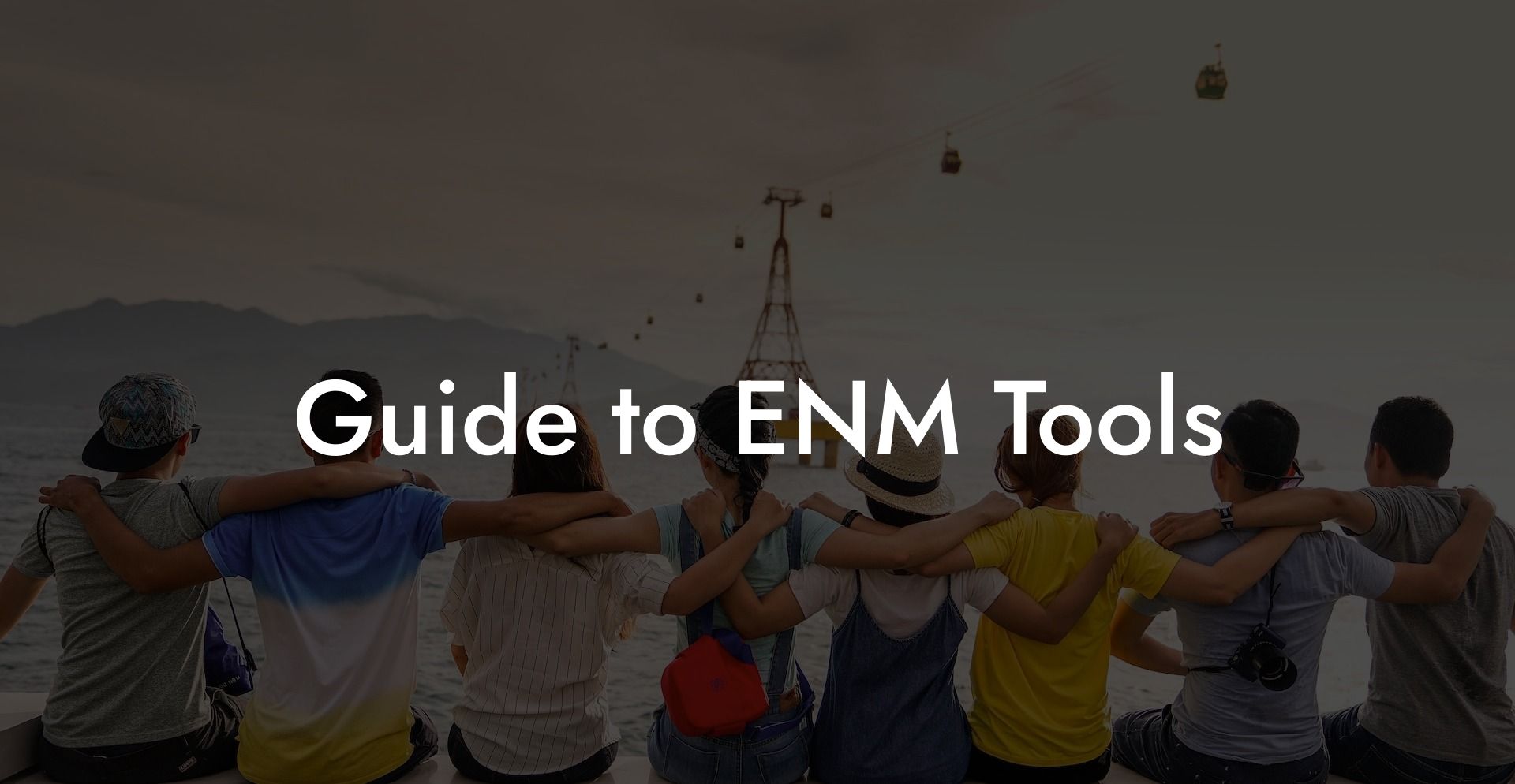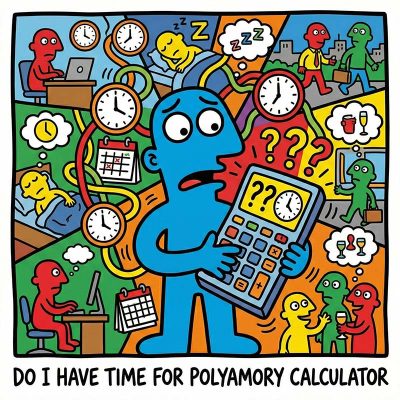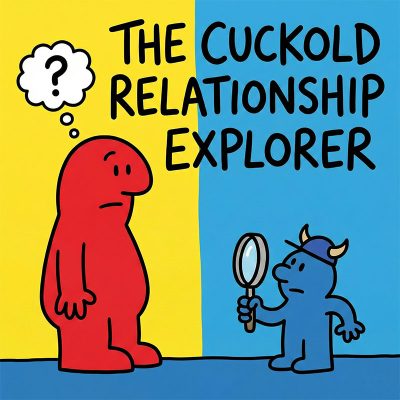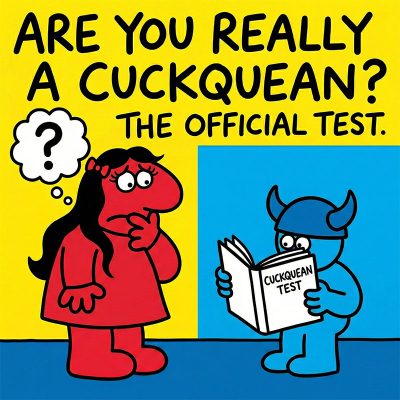Guide to ENM Tools

Welcome, adventurous souls and lovers of freedom! If you’re diving into the world of Ethical Non-Monogamy (ENM) and want to optimize every aspect of your journey, you’ve landed in the right spot. This guide is your comprehensive toolkit, a treasure trove of digital apps, communication hacks, safety protocols, and community resources designed to support and enhance your ENM lifestyle. Whether you’re a seasoned ENM veteran or just curious about taking your relationships to the next level, get ready to explore, laugh, and learn how to make your love life as smooth as your favorite playlist.
Quick Links to Useful Sections
- Understanding ENM Tools
- What Are ENM Tools?
- Useful ENM Tools Our Team Have Created
- Communication and Coordination Tools
- Messaging and Group Chat Apps
- Scheduling and Organization Apps
- Sexual Health and Safety Tools
- Safe Sex and STI Management Apps
- Privacy and Security Tools
- Relationship Management and Documentation Tools
- Journaling and Self-Reflection Apps
- Relationship Tracking and Agreement Tools
- Educational and Community Resources
- Blogs, Podcasts, and Books
- Online Forums and Social Media Groups
- Creating Your Custom ENM Toolkit
- Assessing Your Needs and Preferences
- Integrating Tools Into Your Daily Routine
- Real-Life Applications: How ENM Tools Enhance Relationships
- Expert Insights: Advice on Using ENM Tools Effectively
- FAQ: Your ENM Tools Questions Answered with Honesty and Humor
- Resources and Community Support: Your Guide to Further ENM Tools and Insights
- Top Books, Podcasts, and Blogs
- Finding Professional Guidance and Peer Networks
Understanding ENM Tools
What Are ENM Tools?
ENM tools are the digital, physical, and practical resources that help individuals and couples navigate the complexities of ethical non-monogamy. They range from apps that streamline communication and scheduling to resources that support sexual health, privacy, and community connection. Think of them as your relationship Swiss Army knife, each tool is designed to help you solve a problem, enhance your experience, and empower you to live authentically.
In an environment where open dialogue, transparency, and trust are non-negotiable, having the right toolkit can be a game-changer. Keywords like ENM apps, relationship management tools, and sexual health resources are at the heart of this evolving digital ecosystem.
Useful ENM Tools Our Team Have Created

Theory is sexy. Reality is messy. You agreed you could date others, but how does your stomach drop when he takes her to your anniversary spot? Or when she comes home smelling like someone else?
This simulator drags your abstract rules into the harsh light of day. We force you to confront the visceral, gut-wrenching scenarios that actually destroy relationships, before they happen. Test your nervous system in the simulator so you don't crash the car in real life.

The world of non-monogamy is a maze of confusing labels. Trying to be "Polyamorous" when your heart actually needs "Swinging" isn't just a vocabulary error; it’s a recipe for misery.
You can't build a stable home on a foundation that doesn't fit your psychology. This tool analyzes your emotional bandwidth and jealousy triggers to design the exact structure you need. Stop trying to squeeze into a box that doesn't fit. Build a relationship that actually feels like home.

Opening up feels exciting, but if you aren't reading from the same script, you're writing a tragedy. The disconnect between "I want freedom" and "I want safety" is where hearts break. This isn't just a quiz; it’s a synchronization engine.
We identify the silent gaps in your desires—from sleepover rules to emotional bandwidth, before they become unbridgeable chasms. Don't wait until the damage is done to find out you were never on the same page. Align your compasses now.

The fantasy is intoxicating. The reality? It can be terrifying. That sickening drop in your stomach when she leaves isn't just nerves; it's the fear of the unknown threatening everything you’ve built. Don't let vague agreements become grounds for disaster. You need structure before the chaos hits.
The Hotwife Contract Creator transforms your deepest anxieties about safety, emotions, and "going too far" into a rock-solid, signed agreement. Silence the jealousy and lock down your safety net so you can actually survive the thrill.

The fantasy is incredible, but the logistics can tear you apart. That sickening knot of anxiety you feel when she leaves isn't weakness; it's your brain warning you that you're flying without a safety net. Ambiguity is the oxygen that jealousy breathes. Don't let undefined "gray areas" become the reason your marriage implodes.
The Official Hotwife Rules Generator doesn't just list acts; it builds a protective fortress around your relationship. Get the concrete roadmap you need to ensure this high-stakes adventure doesn't turn into a disaster.

The fantasy is endless romance. The reality? It’s a logistical nightmare. Dating isn't just sex; it’s a second job of swiping, spending, and emotional processing that drains your sanity. Underestimating the "admin" of non-monogamy is the fastest way to turn your relationship into a burnout factory where resentment thrives.
This calculator forces you to confront the brutal math of your time, energy, and wallet. Can you actually afford this lifestyle, or are you just signing up for exhaustion?

"I thought we agreed" is the sentence that destroys relationships & marriages. Relying on verbal promises when emotions run high is a gamble you cannot afford to lose. Your memory isn't just faulty; it's a liability. Ambiguity is the oxygen that jealousy breathes, turning "freedom" into a minefield of "did I mess up?"
This generator transforms vague permissions into a concrete, signed reality. Stop arguing about what you thought was said and lean on what is written. Secure your boundaries in ink, not hope.

Love is infinite, but your calendar is brutally finite. The fantasy is deep connection; the reality is often just exhausted "calendar tetris." Promising time you don't actually have isn't romantic, it’s a recipe for burnout and broken trust. That sinking feeling when you have to cancel again? That’s the sound of overextension destroying your relationships.
This calculator forces you to confront the math of your life. Do you actually have space for another heart, or are you just setting everyone up for disappointment?

The fantasy is intoxicating. The reality? It can be a psychological car crash. That gut-wrenching drop when the bedroom door locks you out isn't just nerves, it’s a warning. 90% of men love the porn but crumble under the visceral weight of actual exclusion and emotional coldness.
This test drags your ego into the harsh light of day. We measure your resilience against the specific triggers that destroy marriages. Are you a true Cuckold or just a Tourist about to self-destruct? Check your ego before you wreck your life.

The fantasy is a rush, but the reality is a razor’s edge. That sickening drop when "humiliation" stops being a game and starts destroying his self-worth isn't a risk. It is the end of your marriage. Confusing "Stag" pride with "Cuckold" degradation is the fastest way to trauma.
This tool drags your hidden desires into the light. Pinpoint exactly where the fun stops and the pain begins, from gentle teasing to hard exclusion. Define your limits now before a misunderstanding becomes a permanent scar.

The fantasy is empowerment. The reality is often quiet desperation. That sinking feeling in your chest when he looks at her is not a kink. It is your intuition screaming that you are compromising your boundaries just to keep him around. True cuckqueaning is driven by your active desire, not your fear of abandonment.
This diagnostic drags your true motives into the light. Are you an empowered Queen, or are you playing the Martyr to save a failing relationship? Test your agency before you break your own heart.

The fantasy is intoxicating. The reality? It can be a psychological car crash. That gut-wrenching drop when the bedroom door locks you out isn't just nerves, it’s a warning. 90% of men love the porn but crumble under the visceral weight of actual exclusion and emotional coldness.
This test drags your ego into the harsh light of day. We measure your resilience against the specific triggers that destroy marriages. Are you a true Cuckold or just a Tourist about to self-destruct? Check your ego before you wreck your life.
Communication and Coordination Tools
Messaging and Group Chat Apps
Clear, consistent communication is the lifeblood of any ENM relationship. Messaging apps help you stay connected with all your partners and coordinate plans seamlessly. Here are some favorites:
- Signal: For encrypted, secure conversations, ideal for sensitive topics and private check-ins.
- WhatsApp: A widely used platform for both one-on-one chats and group discussions, perfect for casual updates and planning.
- Discord: Create private servers where you can set up dedicated channels for different groups or topics, from scheduling to sharing fun memes related to your ENM journey.
Scheduling and Organization Apps
When you’re juggling multiple relationships, keeping track of dates, events, and important check-ins can be a challenge. Scheduling tools help you manage your time without missing a beat.
- Google Calendar: Create separate calendars for each relationship or activity, and share them with your partners as needed.
- Doodle: Find a mutually convenient time for group meetings or one-on-one catch-ups with ease.
- Trello or Asana: For those who love a visual approach to organizing tasks and setting reminders for relationship check-ins or important discussions.

The freedom of an open relationship sounds incredible, but the logistics can feel like holding a grenade. That spinning "what if" anxiety isn't paranoia, it’s your survival instinct warning you that your bond is exposed. "Just seeing what happens" is the fastest way to turn a fantasy into a breakup.
The Essential Guide replaces chaos with discipline. We give you the blueprints, jealousy protocols, and repair scripts needed to explore the edge without falling off. Don't guess. Secure your foundation first.

The world of non-monogamy is a maze of confusing labels. Trying to be "Polyamorous" when your heart actually needs "Swinging" isn't just a vocabulary error; it’s a recipe for misery.
You can't build a stable home on a foundation that doesn't fit your psychology. This tool analyzes your emotional bandwidth and jealousy triggers to design the exact structure you need. Stop trying to squeeze into a box that doesn't fit. Build a relationship that actually feels like home.

Opening up feels exciting, but if you aren't reading from the same script, you're writing a tragedy. The disconnect between "I want freedom" and "I want safety" is where hearts break. This isn't just a quiz; it’s a synchronization engine.
We identify the silent gaps in your desires—from sleepover rules to emotional bandwidth, before they become unbridgeable chasms. Don't wait until the damage is done to find out you were never on the same page. Align your compasses now.

Theory is sexy. Reality is messy. You agreed you could date others, but how does your stomach drop when he takes her to your anniversary spot? Or when she comes home smelling like someone else?
This simulator drags your abstract rules into the harsh light of day. We force you to confront the visceral, gut-wrenching scenarios that actually destroy relationships, before they happen. Test your nervous system in the simulator so you don't crash the car in real life.

The fantasy is endless romance. The reality? It’s a logistical nightmare. Dating isn't just sex; it’s a second job of swiping, spending, and emotional processing that drains your sanity. Underestimating the "admin" of non-monogamy is the fastest way to turn your relationship into a burnout factory where resentment thrives.
This calculator forces you to confront the brutal math of your time, energy, and wallet. Can you actually afford this lifestyle, or are you just signing up for exhaustion?

"I thought we agreed" is the sentence that destroys relationships & marriages. Relying on verbal promises when emotions run high is a gamble you cannot afford to lose. Your memory isn't just faulty; it's a liability. Ambiguity is the oxygen that jealousy breathes, turning "freedom" into a minefield of "did I mess up?"
This generator transforms vague permissions into a concrete, signed reality. Stop arguing about what you thought was said and lean on what is written. Secure your boundaries in ink, not hope.
Sexual Health and Safety Tools
Safe Sex and STI Management Apps
Sexual health is non-negotiable in any consensual non-monogamy arrangement. Thankfully, several apps and resources help you stay on top of your health:
- MySexDoctor: Provides expert advice and resources for sexual health, ensuring you get reliable information at your fingertips.
- Safe Sex Reminder: An app that sends you periodic reminders about safe sex practices and when to schedule STI tests.
- Health tracking apps: Some comprehensive health apps allow you to log sexual encounters, set reminders for regular testing, and even share updates securely with your partners if you choose.
Privacy and Security Tools
In the ENM world, maintaining privacy is crucial. Tools that safeguard your information help ensure that your personal and relationship details remain secure:
- Password Managers: Tools like LastPass or 1Password help you manage and secure all your login credentials, from dating apps to communication platforms.
- VPN Services: Use a reputable VPN to protect your online activity, especially when accessing sensitive information or communicating on public networks.
- Secure File Sharing: Apps like Signal and ProtonMail provide encrypted messaging and file sharing, ideal for discussing private details or sharing documents like relationship agreements.
Relationship Management and Documentation Tools
Journaling and Self-Reflection Apps
Self-awareness is key to thriving in ENM. Journaling apps help you track your emotions, reflect on experiences, and identify patterns that can improve your relationships:
- Day One: A beautiful journaling app that encourages daily reflection and mindfulness, perfect for tracking your ENM journey.
- Journey: Another great option for maintaining a digital diary, with features that allow you to add photos, tag emotions, and even export your entries.
- Moodnotes: Helps you identify and reflect on your emotional states through guided prompts, ideal for managing the ups and downs that sometimes come with ENM.
Relationship Tracking and Agreement Tools
When you’re managing multiple relationships, keeping clear records of agreements, boundaries, and important milestones is invaluable. These tools help you stay organized and on the same page with all your partners:
- Notion: A versatile workspace where you can create databases, calendars, and shared documents detailing your relationship agreements and ongoing check-ins.
- Google Docs: Collaboratively draft and update your relationship guidelines, ensuring that all parties have access to the latest version.
- Evernote: Capture notes from conversations, ideas for future check-ins, and reflections on your ENM experiences, all in one place.
Educational and Community Resources
Blogs, Podcasts, and Books
Knowledge is power, especially when exploring the nuances of ENM. Here are some educational resources that provide both insights and inspiration:
- "The Ethical Slut" by Dossie Easton & Janet Hardy: A classic must-read that offers an in-depth look at ethical non-monogamy and sexual liberation.
- "More Than Two" by Franklin Veaux & Eve Rickert: An enlightening guide on navigating polyamory, with plenty of practical tips for managing multiple relationships.
- Podcasts like "Multiamory" and "The Polyamory Podcast": These shows feature real-life stories, expert advice, and plenty of humor to help you navigate the world of ENM.
- Blogs and Online Communities: Websites like Polyamory.com and Reddit communities (e.g., r/polyamory) are treasure troves of advice, personal experiences, and community support.
Online Forums and Social Media Groups
Connecting with others who share your ENM journey can provide invaluable support and insights. Online forums and social media groups offer spaces to ask questions, share experiences, and even find local meet-ups:
- Reddit: Subreddits like r/polyamory and r/ethicalnonmonogamy are great for anonymous advice and community support.
- Facebook Groups: Join private groups dedicated to ENM to connect with like-minded individuals and couples.
- Discord Servers: Many communities have set up Discord channels where you can engage in real-time conversations and even schedule virtual events or meet-ups.
Creating Your Custom ENM Toolkit
Assessing Your Needs and Preferences
The first step in building your ENM toolkit is understanding your unique needs. Consider the following:
- What are your communication preferences?
- How do you like to schedule and organize your time?
- Which aspects of sexual health and safety are most important to you?
- What educational resources or communities resonate with your personal journey?
By answering these questions, you can tailor your toolkit to suit your lifestyle, ensuring that every tool you choose truly supports your ENM journey.
Integrating Tools Into Your Daily Routine
Once you’ve selected your tools, the next step is to integrate them into your daily life. Here are some practical tips:
- Create a Digital Dashboard: Use apps like Notion or Trello to bring all your ENM tools into one centralized location. This dashboard can include your calendars, journaling entries, and links to key resources.
- Set Routine Check-Ins: Schedule regular times each week to review your communications, update your relationship agreements, and reflect on your personal growth.
- Automate Reminders: Use your scheduling apps to send reminders for STI testing, journal entries, or upcoming group check-ins. Automation keeps you on track without overwhelming your day.
Real-Life Applications: How ENM Tools Enhance Relationships
Consider the story of Alex and Taylor, a couple navigating a busy polyamorous life. They use a shared Google Calendar to coordinate dates, a Notion workspace to document their relationship agreements, and a private Discord server to keep in touch with their extended ENM community. With these tools, they’ve turned what could be a logistical nightmare into a smoothly orchestrated symphony of connection.
Tools not only simplify the practical aspects of ENM, but they also create space for deeper, more authentic connections. By reducing the chaos of coordination, you can focus more on the emotional and personal growth aspects of your relationships.
Expert Insights: Advice on Using ENM Tools Effectively
Relationship therapists and ENM experts agree: the right tools can make all the difference. Dr. Jamie Rivera, an expert in non-traditional relationships, says, “Using digital tools to manage communication and scheduling helps reduce stress and creates a more organized, transparent relationship environment.” Meanwhile, life coach Morgan Lee adds, “When you have a reliable toolkit, you’re free to focus on what truly matters, connecting with your partners and growing as an individual.”
These expert insights reinforce the idea that technology and organization are not barriers to intimacy, they’re the very means by which you can deepen trust, enhance communication, and live your ENM life to its fullest potential.
FAQ: Your ENM Tools Questions Answered with Honesty and Humor
1. What exactly are ENM tools?
ENM tools are the digital, physical, and practical resources, such as apps, scheduling software, and educational materials, that help you navigate the complexities of ethical non-monogamy.
2. How can communication apps improve my ENM experience?
They keep all your partners in the loop and help you coordinate plans, share updates, and discuss boundaries in a secure, organized way.
3. Which scheduling tools are best for managing multiple relationships?
Popular options include Google Calendar for its flexibility, Doodle for group scheduling, and Trello or Asana for a more visual, task-oriented approach.
4. What sexual health tools should I consider?
Look into apps and services that offer safe sex reminders, STI tracking, and expert advice on sexual health, such as MySexDoctor and dedicated health tracking apps.
5. How can journaling apps help with ENM?
Journaling apps like Day One and Journey enable you to reflect on your experiences, track your emotions, and gain valuable insights into your personal growth.
6. What are some good tools for documenting relationship agreements?
Notion, Google Docs, and Evernote are excellent choices for drafting and maintaining shared relationship agreements and boundaries.
7. How do I ensure my online communications are secure?
Use encrypted messaging apps like Signal and VPN services to protect your privacy. Additionally, secure file-sharing tools can help keep sensitive information safe.
8. What resources are available for learning more about ENM?
Books like "The Ethical Slut" and "More Than Two," podcasts such as "Multiamory," and online communities on Reddit and Facebook provide a wealth of knowledge.
9. How can I integrate these tools into my daily routine?
Create a digital dashboard using tools like Notion or Trello, set regular check-in reminders, and automate tasks such as scheduling and health reminders to streamline your ENM lifestyle.
10. Where can I find peer support for my ENM journey?
Online forums, social media groups, and dedicated communities on platforms like Reddit (e.g., r/polyamory) and Discord offer spaces for support, advice, and shared experiences.
Resources and Community Support: Your Guide to Further ENM Tools and Insights
Top Books, Podcasts, and Blogs
Explore these resources to deepen your understanding and enhance your toolkit:
- "The Ethical Slut" by Dossie Easton & Janet Hardy – A classic guide that covers the fundamentals of ethical non-monogamy.
- "More Than Two" by Franklin Veaux & Eve Rickert – Offers practical advice and insights for managing multiple relationships.
- Podcasts: “Multiamory,” “The Polyamory Podcast,” and similar shows provide inspiring stories and expert advice.
- Blogs & Online Communities: Join forums like r/polyamory or specialized Facebook groups to share and learn from real-life experiences.
Finding Professional Guidance and Peer Networks
Consider seeking guidance from therapists or relationship coaches who specialize in ENM to help navigate challenges. Additionally, connecting with peer networks, both online and locally, can offer support, share experiences, and provide practical tips to enhance your ENM journey.
With the right mix of technology, organization, and community, your ENM toolkit can empower you to live your most authentic, fulfilling love life. Embrace the adventure, stay curious, and let these tools help you build deeper, more meaningful connections.

The freedom of an open relationship sounds incredible, but the logistics can feel like holding a grenade. That spinning "what if" anxiety isn't paranoia, it’s your survival instinct warning you that your bond is exposed. "Just seeing what happens" is the fastest way to turn a fantasy into a breakup.
The Essential Guide replaces chaos with discipline. We give you the blueprints, jealousy protocols, and repair scripts needed to explore the edge without falling off. Don't guess. Secure your foundation first.

The world of non-monogamy is a maze of confusing labels. Trying to be "Polyamorous" when your heart actually needs "Swinging" isn't just a vocabulary error; it’s a recipe for misery.
You can't build a stable home on a foundation that doesn't fit your psychology. This tool analyzes your emotional bandwidth and jealousy triggers to design the exact structure you need. Stop trying to squeeze into a box that doesn't fit. Build a relationship that actually feels like home.

Opening up feels exciting, but if you aren't reading from the same script, you're writing a tragedy. The disconnect between "I want freedom" and "I want safety" is where hearts break. This isn't just a quiz; it’s a synchronization engine.
We identify the silent gaps in your desires—from sleepover rules to emotional bandwidth, before they become unbridgeable chasms. Don't wait until the damage is done to find out you were never on the same page. Align your compasses now.

Theory is sexy. Reality is messy. You agreed you could date others, but how does your stomach drop when he takes her to your anniversary spot? Or when she comes home smelling like someone else?
This simulator drags your abstract rules into the harsh light of day. We force you to confront the visceral, gut-wrenching scenarios that actually destroy relationships, before they happen. Test your nervous system in the simulator so you don't crash the car in real life.

The fantasy is endless romance. The reality? It’s a logistical nightmare. Dating isn't just sex; it’s a second job of swiping, spending, and emotional processing that drains your sanity. Underestimating the "admin" of non-monogamy is the fastest way to turn your relationship into a burnout factory where resentment thrives.
This calculator forces you to confront the brutal math of your time, energy, and wallet. Can you actually afford this lifestyle, or are you just signing up for exhaustion?

"I thought we agreed" is the sentence that destroys relationships & marriages. Relying on verbal promises when emotions run high is a gamble you cannot afford to lose. Your memory isn't just faulty; it's a liability. Ambiguity is the oxygen that jealousy breathes, turning "freedom" into a minefield of "did I mess up?"
This generator transforms vague permissions into a concrete, signed reality. Stop arguing about what you thought was said and lean on what is written. Secure your boundaries in ink, not hope.
Accountability When Harm Happens
Attachment Styles In Non Monogamous Relationships
Avoiding Coercion And Pressure
Avoiding Emotional And Relational Exhaustion
Balancing Work Family And Relationships
Barrier Use And Risk Profiles
Boundaries Versus Rules In Practice
Building Supportive Community
Coming Out As Non Monogamous
Common Myths About Ethical Non Monogamy
Communication And Agreements
Compersion And Shared Joy
Conflict Resolution In Multi Partner Dynamics
Consent As The Foundation Of Non Monogamous Relationships
Core Values That Define Ethical Non Monogamy
Creating Agreements That Can Evolve
Dating While Non Monogamous
De Escalation And Conscious Uncoupling
Deciding Who To Tell And When
Defining Success In Ethical Non Monogamy
Digital Safety And Privacy
Disclosure And Informed Consent With New Partners
Emotional Regulation In Complex Relationships
Emotional Safety Alongside Physical Safety
Ethical Non Monogamy Across Different Cultures
Fear Of Abandonment And Reassurance
Financial Transparency And Boundaries
Growth Change And Ethics
Handling Cancellations And Letdowns
Hierarchical Versus Non Hierarchical Models
Honesty Versus Oversharing
How Ethical Non Monogamy Differs From Cheating
How Media Representation Shapes Public Perception
How Often To Revisit Agreements
How Relationships Change Over Time
How To Choose A Structure That Fits
How To Start The Ethical Non Monogamy Conversation
In Person Events And Meetups
Integrating New Partners Ethically
Intersectionality And Identity
Jealousy As A Skill Building Opportunity
Legal And Social Risks
Maintaining Rituals And Quality Time
Managing Insecurity And Comparison
Monogamish Relationships
Navigating Different Risk Tolerances
Navigating Judgment From Monogamous Culture
Navigating Mismatched Desires
Online Spaces And Their Role
Open Relationships Explained
Parallel Versus Kitchen Table Dynamics
Polyamory And Multiple Loving Relationships
Power Imbalances And Privilege
Pregnancy And Fertility Conversations
Processing Shame And Social Conditioning
Psychology And Emotional Work
Relationship Anarchy Principles
Repairing Communication Breakdowns
Scheduling Without Burnout
Self Worth Outside Relationship Status
Setting Intentions Before Opening A Relationship
Sexual Health Agreements And Testing Norms
Sexual Health And Safety
Shared Calendars And Planning Tools
Social And Community Considerations
Solo Polyamory And Autonomy
Substance Use And Consent
Supporting Partners Through Health Scares
Swinging As A Social And Sexual Practice
The Difference Between Structure And Freedom
The History And Cultural Roots Of Ethical Non Monogamy
Time Energy And Logistics
Time Management With Multiple Partners
Travel And Long Distance Dynamics
Treating All Partners As Whole People
Types And Relationship Structures
What Ethical Non Monogamy Is And What It Is Not
When Non Monogamy Activates Trauma
When One Partner Wants Monogamy Again
Why People Choose Ethical Non Monogamy
Lost & confused by all of the terms, types and seemingly made up 3 letter acronyms?? We've got you. Check out our Ethnical Non-Monogamy Dictionary >>
Useful Interruption: Not sure which relationship vibe fits you best? Take the Ultimate Relationship Test, it will give you details into your natural relationship style. Then, dive into our binge-worthy guides, from the tried-and-true to the “wait, that’s a thing?", and find the perfect relationship type for your life.
Now back to the main article but yeah take the Ultimate Relationship Test
